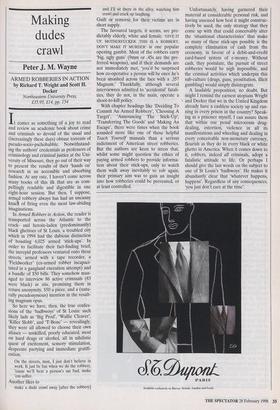Making dudes crawl
Peter J. M. Wayne
ARMED ROBBERIES IN ACTION by Richard T. Wright and Scott H. Decker Northeastern University Press, L35.95, £14, pp. 154 It comes as something of a joy to read and review an academic book about crime and criminals so devoid of the usual and (increasingly these days) obtuse torrents of pseudo-socio-pschobabble. Notwithstand- ing the authors' credentials as professors of criminology and criminal justice at the Uni- versity of Missouri, they go out of their way to present the results of their 'hands on' research in an accessible and absorbing fashion. At any rate, I haven't come across many books of this ilk that are as com- pellingly readable and digestible in one eight-hour session. But then, I suppose, armed robbery always has had an uncanny knadt of firing even the most law-abiding imaginations.
In Armed Robbers in Action, the reader is transported across the Atlantic to the crack- and heroin-laden (predominantly) black ghettoes of St Louis, a troubled city which in 1994 had the dubious distinction of boasting 6,025 armed 'stick-ups'. In order to facilitate their fact-finding brief, the intrepid professors ventured onto these streets, armed with a tape recorder, a Tieldworkee (ex-armed robber incapaci- tated in a gangland execution attempt) and a bundle of $50 bills. They somehow man- aged to interview 86 active criminals (83 were black) in situ, promising them in return anonymity, $50,a piece, and a (natu- rally pseudonymous) mention in the result- ing magnum opus.
So here we have, then, the true confes- sions of the `badbwoys' of St Louis: such likely lads as 'Big Prod', 'Waffle Cleaver', `Killer Slobb', and `T-Bone' — revealingly, they were all allowed to choose their own aliases — unskilled, poorly educated, most on hard drugs or alcohol, all in nihilistic quest of excitement, sensory stimulation, desperate partying and immediate gratifi- cation.
On the streets, man, I just don't believe in work. It just be fun when we do the robbery, 'cause we'll beat a person's ass bad, make 'em suffer.
Another likes to
make a dude crawl away [after the robbery]
and I'll sit there in the alley, watching him crawl and crack up laughing.
Guilt or remorse for their victims are in short supply.
The favoured targets, it seems, are pre- dictably elderly, white and female. 'GIVE IT UP, MOTHERFUCKER. THIS IS A ROBBERY, DON'T MAKE IT MURDER' is one popular opening gambit. Most of the robbers carry `big, ugly guns' (9mm or .45s are the pre- ferred weapons), and if their demands are not immediately met, 'you'd be surprised how co-operative a person will be once he's been smashed across the face with a .357 Magnum.' Thankfully, although several interviewees admitted to 'accidental' fatali- ties, they do not, in the main, operate a shoot-to-kill policy.
With chapter headings like 'Deciding To Commit An Armed Robbery', 'Choosing A Target', 'Announcing The Stick-Up', `Transferring The Goods' and 'Making An Escape', there were times when the book sounded more like one of those helpful Teach Yourself manuals than a serious indictment of American street robberies. But the authors are keen to stress that, whilst some might question the ethics of paying armed robbers to provide informa- tion about their stick-ups, only to watch them walk away inevitably to rob again, their primary aim was to gain an insight into how robberies could be prevented, or at least controlled. Unfortunately, having garnered their material at considerable personal risk, and having assessed how best it might construc- tively be used, the only strategy that they come up with that could conceivably alter the 'situational characteristics' that make so many of these stick-ups possible is the complete elimination of cash from the economy, in favour of a debit-and-credit card-based system of e-money. Without cash, they postulate, the pursuit of street robberies would be nigh impossible, and the criminal activities which underpin this sub-culture (drugs, guns, prostitution, illicit gambling) would simply disintegrate.
A laudable proposition, no doubt. But might I remind the earnest utopians Wright and Decker that we in the United Kingdom already have a cashless society up and run- ning in every prison in the country? Speak- ing as a prisoner myself, I can assure them that within our penal microcosm drug- dealing, extortion, violence in all its manifestations and wheeling and dealing in every. conceivable non-monetary currency, flourish as they do in every black or white ghetto in America. When it comes down to it, robbers, indeed all criminals, adopt a fatalistic attitude to life. Or perhaps I should give the last words on the subject to one of St Louis's tadbwoys'. He makes it abundantly clear that 'whatever happens, happens'. Regardless of any consequences, `you just don't care at the time'.


























































 Previous page
Previous page